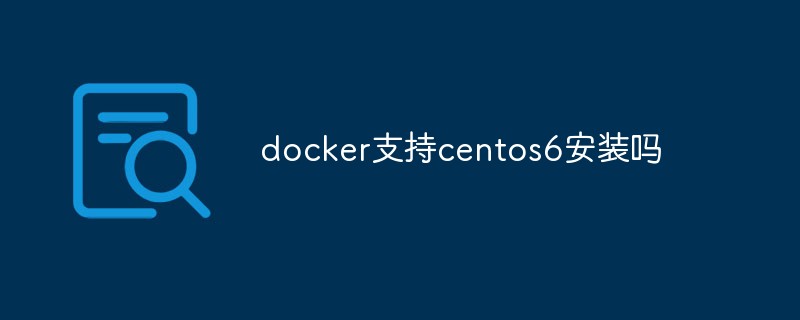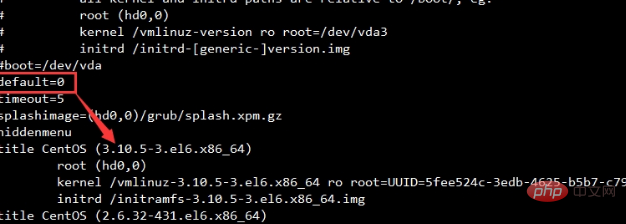Does docker support centos6 installation?
Docker supports centos6 installation; official documents require that "Linux kernel" must be at least 3.8 to install docker, and docker can only run in 64-bit systems, because the kernel versions of "RHEL6" and "CentOS6" are 2.6, so you must first upgrade the kernel of the "CentOS6" system before installing it.

The operating environment of this tutorial: centos6.5 system, docker version 19.03, Dell G3 computer.
docker supports centos6 installation
Official documents require Linux kernel to be at least 3.8, and docker can only run on 64-bit systems. Since the kernel version of RHEL6 and CentOS6 is 2.6, the kernel must be upgraded first.
Docker is an open source application container engine that can easily create a lightweight, portable, self-sufficient container for any application. LXC, AUFS, Go language, and cgroups of Linux are used to achieve resource independence, and isolation of files, resources, networks, etc. can be easily achieved. The ultimate goal is to achieve application isolation similar to PaaS platforms.
The following takes CentOS6.5 (64-bit) as an example to introduce the docker installation steps and usage:
1. Upgrade the kernel (with aufs module)
1. Use yum to install the 3.10 kernel with aufs module
cd /etc/yum .repos.d wget http: //www .hop5. in /yum/el6/hop5 .repo yum install kernel-ml-aufs kernel-ml-aufs-devel
2. Modify grub’s main configuration file /etc/grub.conf and set default=0, which means the content under the first title is The kernel that is started by default (generally the newly installed kernel is in the first position).

3. Restart the system. At this time, your kernel will be successfully upgraded.
[root@localhost ~] # uname -r 3.10.5-3.el6.x86_64
Check whether the kernel supports aufs:
[root@localhost ~] # grep aufs /proc/filesystems nodev aufs
2. Install docker
1. First close selinux:
setenforce 0 sed -i '/^SELINUX=/c\SELINUX=disabled' /etc/selinux/config
2 . The docker-io package has been provided in the Fedora EPEL source. Download and install epel:
rpm -ivh http: //mirrors .sohu.com /fedora-epel/6/x86_64/epel-release-6-8 .noarch.rpm sed -i 's/^mirrorlist=https/mirrorlist=http/' /etc/yum .repos.d /epel .repo
3. Install docker-io with yum:
yum -y install docker-io

service docker start

 ## Check the docker log:
## Check the docker log:
cat /var/log/docker
Recommended learning: "
docker video tutorialThe above is the detailed content of Does docker support centos6 installation?. For more information, please follow other related articles on the PHP Chinese website!

Hot AI Tools

Undresser.AI Undress
AI-powered app for creating realistic nude photos

AI Clothes Remover
Online AI tool for removing clothes from photos.

Undress AI Tool
Undress images for free

Clothoff.io
AI clothes remover

Video Face Swap
Swap faces in any video effortlessly with our completely free AI face swap tool!

Hot Article

Hot Tools

Notepad++7.3.1
Easy-to-use and free code editor

SublimeText3 Chinese version
Chinese version, very easy to use

Zend Studio 13.0.1
Powerful PHP integrated development environment

Dreamweaver CS6
Visual web development tools

SublimeText3 Mac version
God-level code editing software (SublimeText3)

Hot Topics
 1662
1662
 14
14
 1419
1419
 52
52
 1313
1313
 25
25
 1262
1262
 29
29
 1235
1235
 24
24
 How to exit the container by docker
Apr 15, 2025 pm 12:15 PM
How to exit the container by docker
Apr 15, 2025 pm 12:15 PM
Four ways to exit Docker container: Use Ctrl D in the container terminal Enter exit command in the container terminal Use docker stop <container_name> Command Use docker kill <container_name> command in the host terminal (force exit)
 How to copy files in docker to outside
Apr 15, 2025 pm 12:12 PM
How to copy files in docker to outside
Apr 15, 2025 pm 12:12 PM
Methods for copying files to external hosts in Docker: Use the docker cp command: Execute docker cp [Options] <Container Path> <Host Path>. Using data volumes: Create a directory on the host, and use the -v parameter to mount the directory into the container when creating the container to achieve bidirectional file synchronization.
 How to start containers by docker
Apr 15, 2025 pm 12:27 PM
How to start containers by docker
Apr 15, 2025 pm 12:27 PM
Docker container startup steps: Pull the container image: Run "docker pull [mirror name]". Create a container: Use "docker create [options] [mirror name] [commands and parameters]". Start the container: Execute "docker start [Container name or ID]". Check container status: Verify that the container is running with "docker ps".
 How to restart docker
Apr 15, 2025 pm 12:06 PM
How to restart docker
Apr 15, 2025 pm 12:06 PM
How to restart the Docker container: get the container ID (docker ps); stop the container (docker stop <container_id>); start the container (docker start <container_id>); verify that the restart is successful (docker ps). Other methods: Docker Compose (docker-compose restart) or Docker API (see Docker documentation).
 How to check the name of the docker container
Apr 15, 2025 pm 12:21 PM
How to check the name of the docker container
Apr 15, 2025 pm 12:21 PM
You can query the Docker container name by following the steps: List all containers (docker ps). Filter the container list (using the grep command). Gets the container name (located in the "NAMES" column).
 How to start mysql by docker
Apr 15, 2025 pm 12:09 PM
How to start mysql by docker
Apr 15, 2025 pm 12:09 PM
The process of starting MySQL in Docker consists of the following steps: Pull the MySQL image to create and start the container, set the root user password, and map the port verification connection Create the database and the user grants all permissions to the database
 How to view logs from docker
Apr 15, 2025 pm 12:24 PM
How to view logs from docker
Apr 15, 2025 pm 12:24 PM
The methods to view Docker logs include: using the docker logs command, for example: docker logs CONTAINER_NAME Use the docker exec command to run /bin/sh and view the log file, for example: docker exec -it CONTAINER_NAME /bin/sh ; cat /var/log/CONTAINER_NAME.log Use the docker-compose logs command of Docker Compose, for example: docker-compose -f docker-com
 How to create containers for docker
Apr 15, 2025 pm 12:18 PM
How to create containers for docker
Apr 15, 2025 pm 12:18 PM
Create a container in Docker: 1. Pull the image: docker pull [mirror name] 2. Create a container: docker run [Options] [mirror name] [Command] 3. Start the container: docker start [Container name]




